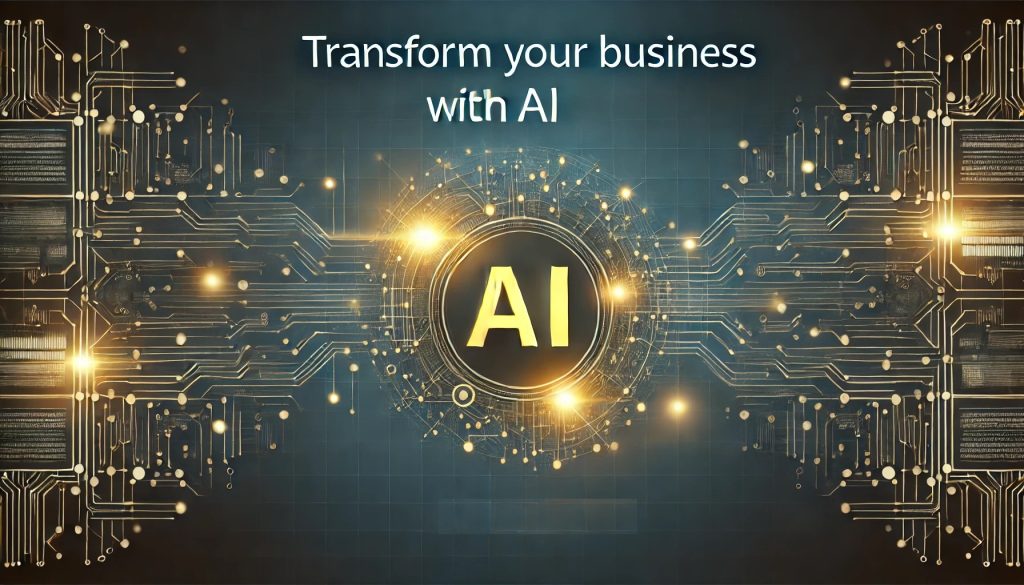
Why AI is Key to Business Transformation
AI is proving to be a game-changer for businesses across multiple industries. The potential for AI to streamline operations, reduce costs, and boost productivity is well-documented. For instance, businesses that integrate AI into their workflows have reported an 80% improvement in productivity. By automating repetitive tasks, AI enables employees to focus on higher-value activities, driving innovation and efficiency. As a result, companies are seeing significant ROI on AI investments, with corporate profits increasing by 45% in some sectors just within the first few months of AI adoption.
Moreover, experts project the global AI market will reach $1.8 trillion by 2030, as industries like banking and retail continue to make massive investments. Generative AI technologies are expected to increase banking revenue by $340 billion. These advancements are not limited to large corporations. Small and medium-sized businesses (SMBs) are increasingly adopting AI to gain a competitive edge, enabling them to operate like larger organizations but with greater agility.
How AI Enhances Business Efficiency
One of the most immediate ways AI can transform your business is by improving operational efficiency. AI tools can analyze vast amounts of data faster and more accurately than humans, providing real-time insights that allow for quicker decision-making. For instance, in customer service, AI-driven chatbots can handle thousands of queries simultaneously, reducing wait times and improving customer satisfaction. Studies show that businesses increase customer satisfaction rates by up to 30% when they implement AI tools effectively.
Additionally, AI’s ability to predict trends and optimize supply chains has helped companies reduce waste and improve logistics. McKinsey reports that 42% of organizations using AI have experienced cost savings, further validating the technology’s efficiency-enhancing potential. In fact, AI adoption has become so widespread that 73% of businesses are already using it in some capacity, whether for data analysis, customer service, or automating routine tasks.
Unlocking New Revenue Streams with AI
In addition to improving efficiency, AI is opening up new revenue streams for businesses. AI-driven product recommendations and personalized marketing strategies enable companies to engage customers in ways that were previously unimaginable. By analyzing consumer behavior, AI can offer tailored recommendations, driving up sales. For example, e-commerce platforms using AI for personalized recommendations report conversion rates up to five times higher than those that do not.
Furthermore, AI is revolutionizing content creation in marketing. Generative AI tools, such as GPT-4, are helping businesses automate content creation, allowing marketers to focus on strategy rather than execution. This approach not only accelerates the content production process but also optimizes it for SEO and tailors it to specific audiences, which leads to higher engagement and revenue.
AI and Workforce Transformation
While AI offers numerous benefits, it’s important to acknowledge its impact on the workforce. There is growing concern that AI could displace jobs, especially in sectors where automation can replace manual tasks. A Forbes survey showed that 77% of consumers fear job losses due to AI. However, AI also presents opportunities for employees to upskill and focus on more creative, strategic tasks. Industries that embrace AI while reskilling their workforce can mitigate job displacement fears while enhancing overall productivity.
AI is also fostering new roles centered around data analytics, AI ethics, and cybersecurity. Seventy-four percent of IT professionals predict a growing need for expertise in data management and security, as AI systems increasingly integrate into business operations. This anticipated demand highlights the importance of these skills in the evolving tech landscape.
Ethical Considerations in AI Implementation
As AI continues to transform businesses, it is crucial to address ethical concerns. Companies must ensure they are using AI responsibly, particularly in areas like data privacy and algorithmic bias. Unfortunately, only 26% of companies using AI have implemented ethical guidelines, which raises significant concerns about transparency and fairness. Implementing AI responsibly not only helps avoid legal issues but also builds trust with consumers, who are increasingly concerned about data privacy.
Addressing these ethical challenges is not just a regulatory requirement but also a business necessity. Consumers are more likely to engage with companies that demonstrate responsible AI use. Therefore, developing a robust ethical framework around AI implementation can provide a competitive advantage.
The Future of AI in Business
Looking ahead, AI will continue to evolve and unlock new opportunities for businesses. With generative AI models becoming more accessible and scalable, companies of all sizes will be able to customize AI to meet their specific needs. This democratization of AI means that the technology is no longer exclusive to tech giants—it is within reach for any business looking to innovate and grow.
In conclusion, if you want to transform your business with AI, the time to act is now. From improving operational efficiency to unlocking new revenue streams, AI offers unparalleled opportunities for growth. However, businesses must also address the challenges that come with AI adoption, including workforce displacement and ethical concerns. By taking a balanced approach, companies can harness the power of AI to stay ahead of the competition and drive long-term success.

